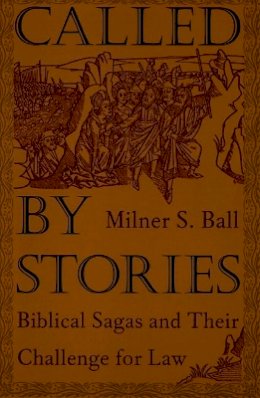
Stock image for illustration purposes only - book cover, edition or condition may vary.
Called by Stories: Biblical Sagas and Their Challenge for Law
Milner S. Ball
€ 46.99
FREE Delivery in Ireland
Description for Called by Stories: Biblical Sagas and Their Challenge for Law
Paperback. Examines sagas and tales from the Bible for the light they shed on the practice of law and on the meaning of a life lived in the legal profession. This book shows that the dilemmas and decisions that legal professionals confront are approached through an experience of narrative in which we come to know ourselves and our actions through stories. Num Pages: 280 pages. BIC Classification: HRCG; LAS. Category: (P) Professional & Vocational. Dimension: 235 x 156 x 20. Weight in Grams: 476.
Distinguished legal scholar and Presbyterian minister Milner S. Ball examines great sagas and tales from the Bible for the light they shed on the practice of law and on the meaning of a life lived in the legal profession. Scholars and laypersons alike typically think of the law as a discipline dominated by reason and empirical methods. Ball shows that many of the dilemmas and decisions that legal professionals confront are more usefully approached through an experience of narrative in which we come to know ourselves and our actions through stories.
He begins with the story of Moses, who is obliged both to speak for God to the Hebrews and to advocate for the Hebrews before God. What, asks Ball, does Moses’s predicament say to lawyers professionally bound to zealous representation of only one client? In the story of Rachel, Ball finds insights that comprehend the role of tears and emotion in the judicial process. He relates these insights to specific contemporary situations, such as a plant closing and the subsequent movement of jobs to Mexico and legal disputes over the sovereignty of native Hawaiians. In a discussion of “The Gospel According to John,” Ball points out that the writer of this gospel is free simultaneously to be critical of law and to rely extensively on it. Ball uses this narrative to explore the boundaries of free will and independence in lawyering. By venturing into the world of powerful events and biblical characters, Ball enables readers to contest their own expectations and fundamental assumptions.
Employing legal theory, theology, and literary criticism, Called by Stories distills a wisdom in biblical texts that speaks specifically to the working life of legal professionals. As such, it will enrich lovers of narrative and poetry, ethicists, literary and biblical scholars, theologians, lawyers, law students, judges, and others who seek to discern deeper meanings in the texts that have shaped their lives.
He begins with the story of Moses, who is obliged both to speak for God to the Hebrews and to advocate for the Hebrews before God. What, asks Ball, does Moses’s predicament say to lawyers professionally bound to zealous representation of only one client? In the story of Rachel, Ball finds insights that comprehend the role of tears and emotion in the judicial process. He relates these insights to specific contemporary situations, such as a plant closing and the subsequent movement of jobs to Mexico and legal disputes over the sovereignty of native Hawaiians. In a discussion of “The Gospel According to John,” Ball points out that the writer of this gospel is free simultaneously to be critical of law and to rely extensively on it. Ball uses this narrative to explore the boundaries of free will and independence in lawyering. By venturing into the world of powerful events and biblical characters, Ball enables readers to contest their own expectations and fundamental assumptions.
Employing legal theory, theology, and literary criticism, Called by Stories distills a wisdom in biblical texts that speaks specifically to the working life of legal professionals. As such, it will enrich lovers of narrative and poetry, ethicists, literary and biblical scholars, theologians, lawyers, law students, judges, and others who seek to discern deeper meanings in the texts that have shaped their lives.
Product Details
Format
Paperback
Publication date
2000
Publisher
Duke University Press United States
Number of pages
280
Condition
New
Number of Pages
280
Place of Publication
North Carolina, United States
ISBN
9780822325246
SKU
V9780822325246
Shipping Time
Usually ships in 7 to 11 working days
Ref
99-1
About Milner S. Ball
Milner S. Ball is both Harmon W. Caldwell Professor of Constitutional Law at the University of Georgia School of Law and an ordained Presbyterian minister. He served as a judge on the International People’s Tribunal in Hawai’i in 1993 and was a founder of the annual Robert Cover Public Interest Law Retreat. A member of the Theological Anthropology Project at the Center of Theological Inquiry at Princeton, he is the author of many books, including The Promise of American Law, Lying Down Together, and The Word and the Law.
Reviews for Called by Stories: Biblical Sagas and Their Challenge for Law
“Milner Ball has written a wonderful book, a sustained and fruitful meditation on the relation between fundamental biblical texts and possible meanings of the practice of law in modern America. He illuminates these crucial texts and the law itself in original, surprising, and highly persuasive ways. A truly impressive achievement.”—James Boyd White, author of Acts of Hope: The Creation of Authority in Literature, Law, and Politics “Simply put, this book is extraordinary. Its author is a wordsmith of the very first order. He says strikingly original things about familiar old texts and acutely probes pressing contemporary issues. Milner Ball is deeply learned across traditional disciplinary lines, but he wears his learning lightly. A wise, clear, and funny conversationalist, he is also extraordinarily deep and inspiring.”—Aviam Soifer, author of Law and the Company We Keep “This artful interweaving of literature and law evokes the power of biblical narrative to inform contemporary life. The result is a rich tapestry of words for sustained reflection and appropriation.”—Phyllis Trible, author of Rhetorical Criticism: Context, Method, and the Book of Jonah
